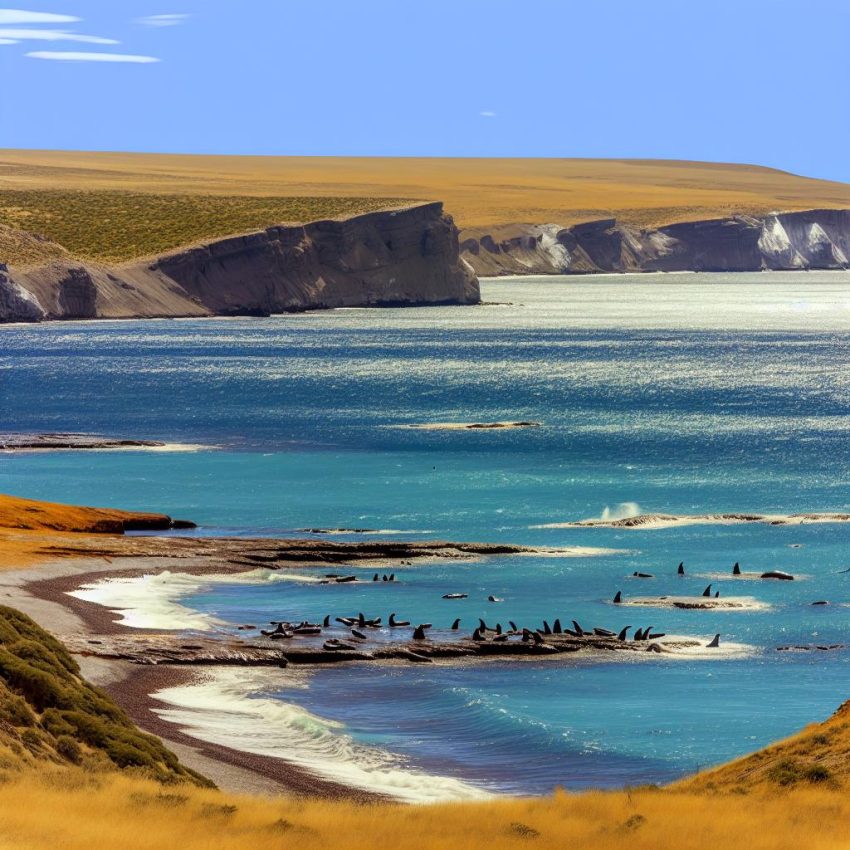Location and Geography
The Valdés Peninsula is strategically located in the northern part of the Chubut Province in the sprawling Argentine Patagonia. Occupying a substantial protrusion into the South Atlantic Ocean, this distinctive geographic feature plays an essential role in the topography of the region. Covering approximately 3,625 square kilometers, the peninsula is marked by an arid climate, which significantly influences its landscape. The terrain is predominantly composed of steppes and dramatic cliffs, contributing to the striking vistas for which the region is renowned. These natural formations not only enhance the area’s beauty but also sustain various unique ecosystems, making the Valdés Peninsula a topic of interest for geographers and environmentalists.
Environmental Significance
Recognized worldwide for its remarkable biodiversity, the Valdés Peninsula has earned the distinguished status of a UNESCO World Heritage Site. This recognition underscores its critical environmental importance and the richness of its natural habitats. The surrounding waters, notably those of Golfo Nuevo and Golfo San José, create biologically rich environments that nurture a wide range of marine life. These waters serve as vital breeding grounds for several species, especially the southern right whale, thus holding considerable interest for marine biologists, ecologists, and conservationists alike.
Flora and Fauna
Despite facing harsh arid conditions, the Valdés Peninsula sustains a varied array of plant life uniquely adapted to its dry climate. The resilient flora plays an instrumental role in supporting the peninsula’s diverse terrestrial wildlife. Among the inhabitants are species like guanacos—akin to small camels indigenous to South America—along with rheas, which resemble ostriches, and the indigenous mara. The coastal zones reveal even more biodiversity, teeming with elephant seals, sea lions, and a plethora of bird species, making them prime locations for wildlife observations and studies.
The Southern Right Whale
Perhaps one of the most profound attractions of the Valdés Peninsula is its integral role as a habitat for the southern right whale. Seasonally, from June to December, these majestic whales migrate to the peninsula’s tranquil bays for breeding purposes, offering an unparalleled opportunity to observe them in their natural habitats. The safe waters provide an ideal environment for the whales to give birth and nurse their young, thereby contributing to the species’ conservation and providing international tourists with unforgettable whale watching experiences.
Human Interaction and Conservation
The Valdés Peninsula is home to several small settlements, with Puerto Pirámides being a noteworthy hub for tourists eager to discover the region’s natural splendors. As the gateway to the peninsula’s attractions, these communities play a crucial role in accommodating and facilitating activities for visitors. Concurrently, significant conservation efforts are underway to safeguard the peninsula’s unique ecosystems from potential threats such as overfishing and climate change. The local government, in partnership with international conservation entities, has instituted policies and protective measures aimed at sustainable tourism practices and the preservation of wildlife habitats.
Tourism and Activities
The Valdés Peninsula offers a variety of activities catering to tourists interested in nature and wildlife. Visitors can partake in wildlife watching excursions that promise up-close encounters with native species. Guided tours are designed to educate tourists about the rich ecosystems, emphasizing the importance of preserving these natural environments. The dramatic landscapes, coupled with abundant wildlife sightings, make the peninsula an ideal destination for photography enthusiasts and those seeking to appreciate nature in its rawest form.
Access and Transportation
Access to the Valdés Peninsula is facilitated through the nearby city of Puerto Madryn. This city serves as a logistical base, equipped with an airport providing flights to major Argentine cities, thereby easing the travel process for domestic and international visitors. From Puerto Madryn, the peninsula is reachable via well-maintained roads, making the journey comfortable and efficient. To enhance the visitor experience while minimizing environmental damage, local tour operators offer packages that balance exploration with ecological responsibility, ensuring tourists enjoy a comprehensive and sustainable visit.
For those eager to visit and explore the Valdés Peninsula, consulting with local tourism boards and organizations dedicated to conservation and education is recommended. These entities provide valuable resources and guidance, promoting an informative and respectful approach to experiencing the area’s natural wonders.

